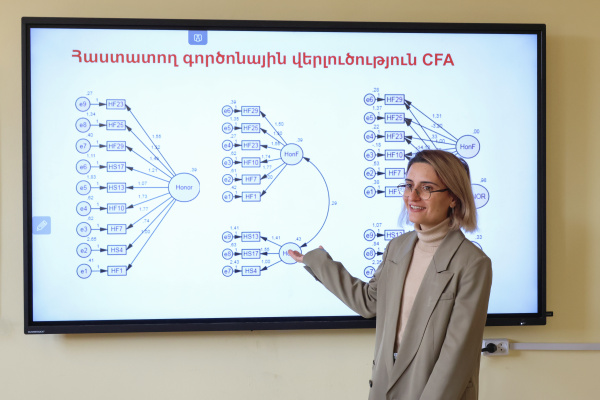November 13, 2024 | 16:40
Career
Education
Perceptual crossing experiment at the core of research
The perceptual crossing experiment reveals the characteristics of interaction among individuals, which can help in understanding the phenomenological nature of communication disorders, as well as improving methods of human-to-human communication mediated by artificial intelligence. The topic has been investigated by Ani Grigoryan, a researcher at Yerevan State University.

Ani Grigoryan, a researcher at the Laboratory of Personality and Social Environment, operating under the Psychological Research Center at YSU Faculty of Philosophy and Psychology, participated in a six-month training at Okinawa Institute of Science and Technology (OIST) in Japan. During this training, the YSU researcher worked not only with experts from Japan, but also with specialists from other countries, exploring prospects for new projects and collaborative research.
During the training, Ani Grigoryan focused on the topic of "The Perceptual Crossing Experiment", specifically researching the application of new quantitative and qualitative analysis of behavioral data.
Ani Grigoryan shared insights about the research conducted, skills acquired, and experiences gained.
Pathways to Scientific Research Training in Japan
Okinawa Institute of Science and Technology (OIST) is a highly regarded graduate university known for its contributions to scientific innovation, making acceptance highly competitive for applicants. To participate in the training program, it was necessary to submit a scientific resume, detailing achievements, projects, and publications, along with a motivational letter. Given that my direct research activities were not in the field of cognitive science, and I had almost no experience in this area, I doubted whether I would be accepted. However, my strong desire and deep interest helped me to secure a spot in this dreamy scientific environment. In the autumn of last year, I applied to the OIST internship program and received a six-month training opportunity in the Embodied Cognitive Science Unit, with financial support covering all travel and living expenses. I chose this program and laboratory, as Japan has been my dream destination for a long time, and the laboratory researches scientific topics that have been within the scope of my interests since my master’s studies.

Focus of the Research
The main focus of my work during training was the quantitative and qualitative analysis of behavioral and self-report data within the framework of the perceptual crossing experiment. In this research, I learned innovative methods and techniques for data analysis, including "Dyadic Data Analysis", "Multilevel Modeling", and "Time Series Analysis". On my initiative, I developed and proposed a new methodological approach for analyzing the behavioral data of this experiment, which led to obtaining innovative results. To compile all of this into an article, it was suggested to extend my training by about one and a half months, as the original period was set to expire in September.
The preparatory work for the article is nearly complete, and it will soon be submitted for publication in international scientific journals. During the development of this paper, I collaborated not only with the Japanese laboratory's experts, but also with international partners from Mexico and Spain.
Skill Development as a Priority
During my training, I delivered several presentations, showcasing both the progress of my work in Japan and the work I conducted at our laboratory at YSU. I had the opportunity to participate in a number of interdisciplinary seminars and workshops organized by the university, with experts from other universities around the world in attendance.
This was an excellent opportunity to gain insight into global trends in scientific development and technological advancements. Additionally, I attended a certified course on " Ethics in Research with Human Participation and Research Integrity and Transparency". I also contributed to ongoing pilot research projects in the laboratory, learning to work with electroencephalography (EEG) equipment.

Not only was I able to study in this environment, but I also proposed a new approach and achieved new results on a concept that was entirely new to me. I consider the prospect of co-authoring an article to be a significant achievement. It will contribute to my growth as a researcher and inspire me to tackle even more ambitious research challenges.
The multicultural environment of the university taught me to appreciate diversity, different viewpoints, and varied approaches, which I believe is crucial for expanding one’s worldview, especially when aiming to engage in international scientific networks.
I also attended Japanese language classes out of personal interest. It was fascinating to learn a language that is structurally and grammatically quite different from the languages I already knew. Japanese is undoubtedly a challenging language to learn, but it offers a unique opportunity to better understand Japanese culture, thereby broadening one’s perspective. This, in turn, contributed to new ideas I had while conducting my research.
Japan’s Educational System and Research Environment
In Japan, the world’s most advanced and innovative research is conducted to expand our understanding of humans, the environment, biodiversity, evolution, cosmic patterns, and to develop technologies and equipment that will improve human life. At the university, there were no laboratories or departments divided by specific fields; instead, all of them were multidisciplinary, bringing together specialists from around the world. This multidisciplinary and multicultural environment is what makes it unique, offering many opportunities to continually discover new things and approach the same problems from different perspectives.
New Approaches, Ideas, and Thinking
As I mentioned, during my training, I learned innovative methods and techniques of data analysis, which I will apply in our laboratory’s current work as we explore new research problems. I worked on topics that could inspire new ideas for advancing our research directions.
In Japan, I also participated in courses on research ethics and scientific integrity, which I consider important for integrating their best practices and established procedures into our own work.
Incidentally, I had the opportunity to connect remotely with an Armenian psychologist based in Canada, who is interested in the activities of our laboratory in Armenia. We are planning an online meeting with the laboratory team soon, and I am sure that interesting projects lie ahead.
For Ani Grigoryan, this training has been a significant boost to her scientific growth, allowing her to explore new approaches in her field and enhance her research capabilities.

